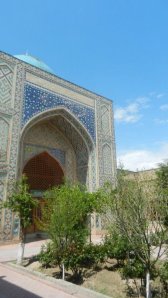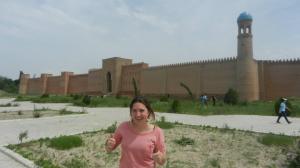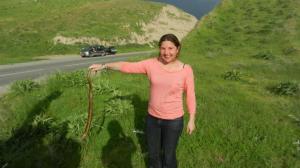So, I’m about to leave Tajikistan. And I was thinking about all these lists about goods and bads and lessons learned that I’d share with this blog. But, at the end of the day, I think on both sides, it comes down to my life in Tajikistan being surprising, and sometimes pretty weird.
In the span of the last three days I’ve given a research presentation to the Persian Department at the Tajik National University, gone on a final Osh picnic to Varzob, and caught the flu, necessitating a visit to the doctor for the first time since I’ve arrived here. Nearly made it!
I’ve tried to keep this blog pretty upbeat all year, but truthfully there were a lot of aspects of studying in Tajikistan that were incredibly difficult and frustrating. Looking back, I absolutely wouldn’t trade the study abroad experience here for all the coasts in Costa Rica, all the romance in Rome, or all the mummies in Egypt, but there are some things I might try to forget, because who wants unpleasant memories?:
Nights spent shivering myself to sleep in the dead of winter.
The sinking feeling of coming home and realizing there was still no electricity.
The loneliness of realizing that the majority of my peer group here was married with a few kids.
Car sickness. So much car sickness. Stop building tall flagpoles and pave some roads, Taj!
Waking up every single day before 6am, because if I went running any later I’d be stared at, followed, shouted at, etc.
Literally living out of a suitcase for 9 months, because my room had no cupboards/closet
Going to bed every night around 10pm, because there just wasn’t anything else to do.
All the oil in Tajik food. Cotton oil, flaxseed oil, vegetable oil, just lots of oil.
Corruption.
Outhouses. Specifically mountain outhouses.
But there are also memories I’ll cherish, things I’ll genuinely miss and hope to see again someday.
If I could remember Tajikistan any way it would be like this:
(finally asked my host family permission to share that!)
Or like this:

Chris, Joey and me, on the Panj River near the Wakhan corridor, in the Pamirs. Behind us are wild batrian camels.
Or maybe like this:

As a US American, I will never cease to be amazed by still-standing structures that are more than 500 years old.
There is a part of me that is also extremely grateful towards Tajikistan. Most languages, you get a pick of your location, dialect, etc. when you decided to study abroad. As a US citizen studying Persian abroad long-term, that’s not really the case. For better or worse, we come to Tajikistan, and even though sometimes the Tajiki-Farsi dichotomy is frustrating, I dread the day when studying here isn’t an option.
I came here a wide-eyed Perso-phile, and I’m leaving as someone who can communicate effectively in Persian (most of the time). So it was worth it. Honestly, I don’t pick up languages easily. And I think the one-on-one/two-on-one classes that I’ve had all year have probably been the reason I’ve come along as far as I have. I’ll deeply miss my professors and my classes.
In case you thought THAT was sentimental, let me turn now to my host family. I’m pretty sure there have been times when my host family thought I was a complete nutter. And there have definitely been times when I thought they were totally bonkers. There have been more cross-cultural miscommunications than I can count. And yet, when I leave, I will miss my host family most. I decided early on that host family bonding was one of my priorities, and thanks to the fact that my host family was genuinely interested in spending time with me, it remained one.
When I was in Khujand last week, my host family called me, just to tell me that they missed me, and that the baby was crying and pointing to my shoes and asking “where’s Amanda.”
I love that when I come home a million people greet me (some of who I’m always supposedly related to but have never met before). I’ve even grown fond of my host brother bursting into my room and demanding that I go with him to buy a shepherd dog (this happens about twice a day). I’ll miss how, even though they think its nuts, they always make sure my Osh is meat-free. I’ll miss my host mom describing the millions of cakes she can make, and my host baby attempting to pray and falling over, and taking my little host cousins for walks around the block (one toddler on my shoulders, two toddlers holding my hands).
I’ll miss it all.
So that’s that. Three more days in Tajikistan, three weeks in the U.S., and then summer in India. Although I’ll miss Tajikistan, I’m really looking forward to the immediate future. One last poem, an extract from Attar’s Conference of the Birds (Fitzgerald Translation):
For like a child sent with a fluttering Light
To feel his way along a gusty Night
Man walks the World: again and yet again
The Lamp shall be by Fits of Passion slain:
But shall not he who sent him from the Door
Relight the Lamp once more, and yet once more?
خدا حافظ,
Amanda















